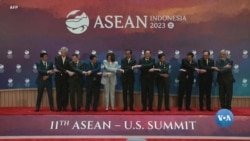ຮອງປະທານາທິບໍດີ ທ່ານນາງ ຄາມາລາ ແຮຣິສ ເວົ້າວ່າ ທ່ານນາງເຊື່ອວ່າ ສະຫະລັດ ຄວນເປັນຜູ້ນຳພາໂດຍສ້າງຕັ້ງພັນທະມິດເພື່ອຄຸ້ມຄອງບັນຫາຂອງຄວາມຂັດແຍ້ງ. ອະດີດປະທານາທິບໍດີ ທ່ານ ດໍໂນລ ທຣຳ ກ່າວວ່າ ການຄາດຄະເນຂອງທ່ານກ່ຽວກັບຄວາມເຂັ້ມແຂງ, ແລະ ການ ຄາດເດົາບໍ່ໄດ້, ສາມາດຢຸດສົງຄາມກ່ອນທີ່ມັນຈະເລີ້ມຕົ້ນຂຶ້ນ.
ໃນເດືອນ ມັງກອນ ປີ 2025, ທ່ານ ດໍໂນລ ທຣໍາ ຫຼື ທ່ານນາງ ຄາມາມາ ແຮຣິສ ຄົນໃດຄົນນຶ່ງຈະກາຍເປັນປະທານາທິບໍດີອາເມຣິກັນຄົນຕໍ່ໄປ. ເຊິ່ງເປັນ ສຽງທີ່ສໍາຄັນໃນການກໍານົດຜົນປະໂຫຍດທາງດ້ານພູມສາດການເມືອງຂອງ ສະຫະລັດ ແລະເປັນຜູ້ບັນຊາການທະຫານສູງສຸດ ທີ່ຈະຊີ້ນໍາກອງທັບທີ່ມີອໍາ ນາດທີ່ສຸດໃນໂລກ.
ທ່ານ ດໍໂນລ ທຣໍາ, ຜູ້ໄດ້ຮັບການສະເໜີຊື່ລົງແຂ່ງຂັນເອົາຕໍາແໜ່ງປະທານາ ທິບໍດີຈາກພັກຣີພັບບລີກັນ ກ່າວວ່າ:
“ຂ້ອຍບໍ່ມີສົງຄາມ. ຂ້ອຍບໍ່ເຄີຍເຮັດສົງຄາມ, ນອກເໜືອຈາກສົງຄາມກັບກຸ່ມ ISIS, ທີ່ຂ້ອຍໄດ້ເອົາຊະນະໄປແລ້ວ, ແຕ່ນັ້ນ ແມ່ນສົງຄາມທີ່ໄດ້ເລີ້ມຕົ້ນຂຶ້ນ. ພວກເຮົາບໍ່ໄດ້ມີສົງຄາມໃດອີກ. ຂ້ອຍສາມາດຢຸດສົງຄາມໄດ້ດ້ວຍການໃຊ້ ໂທລະສັບ.”
ທ່ານ ທຣໍາ ບໍ່ເຄີຍອະທິບາຍວ່າ ທ່ານຈະສິ້ນສຸດສົງຄາມດ້ວຍວິທີໃດ.
ໃນຂະນະທີ່ ທ່ານ ໂຈ ໄບເດັນ ຍັງຄົງດໍາລົງຕໍາແໜ່ງ, ຣັດເຊຍ ໄດ້ບຸກໂຈມຕີ ຢູເຄຣນ, ແລະກຸ່ມຫົວຮຸນແຮງຮາມາສ ພ້ອມທັງກຸ່ມເຮັສໂບລລາ ໄດ້ທໍາການ ບຸກໂຈມຕີ ອິສຣາແອລ, ຈົນນຳໄປສູ່ການຕໍ່ສູ້ແກ້ແຄ້ນທີ່ນອງ ເລືອດມາ ເປັນເວລາ 1 ປີ ໂດຍກອງກຳລັງຂອງ ອິສຣາແອລ. ບໍ່ມີສົງຄາມໃຫຍ່ໃດໆ ໄດ້ເລີ້ມຕົ້ນຂຶ້ນພາຍໃຕ້ລັດຖະບານຂອງ ທ່ານ ທຣໍາ, ແລະທ່ານເອງ ກໍບໍ່ໄດ້ ເຮັດໃຫ້ ສະຫະລັດ ມີສ່ວນຮ່ວມໃນຄວາມຂັດແຍ້ງໃໝ່ທາງດ້ານອາວຸດ. ບັນດາຜູ້ຄົນທີ່ສະໜັບສະໜູນ ທ່ານ ທຣໍາ ຮ້ອງສິ່ງນີ້ວ່າ ສັນຕິພາບຜ່ານຄວາມ ເຂັ້ມແຂງ.
ພັກເດໂມແຄຣັດ ໂຕ້ແຍ້ງວ່າ ມັນເປັນເລື່ອງບັງເອີນ ແລະກ່າວວ່າ ໃນຕອນ ທ້າຍຂອງລັດຖະບານ ທ່ານ ທຣໍາ, ທະຫານສະຫະລັດ ຍັງຕໍ່ສູ້ຢູ່ໃນ ອັຟການິສຖານ, ຊີເຣຍ, ອີຣັກ ແລະ ເຢເມນ.
ນັ້ນ ຍັງບໍ່ຄວາມສາມາດທີ່ຄາດເດົາໄດ້ຂອງ ທ່ານ ທຣໍາ, ເຊິ່ງນັກປະຫວັດສາດ ກ່ຽວກັບປະທານາທິບໍດີຮ້ອງສິ່ງນີ້ວ່າ “ທິດສະດີຂອງຜູ້ຊາຍຜີບ້າ.”
ທ່ານ ໂທມັສ ຊວດ (Thomas Schwartz), ຈາກມະຫາວິທະຍາໄລ ແວນເດີບີວທ໌ (Vanderbilt) ກ່າວຜ່ານສໄກປ໌ ວ່າ:
“ຄວາມຄິດໂດຍການທໍາທ່າ, ຫຼື ຢ່າງນ້ອຍກໍເບິ່ງຄື, ເຕັມໃຈທີ່ຈະເປັນຄົນຜີບ້າ ໃນນະໂຍບາຍຕ່າງປະເທດ ແລະ ການແກ້ແຄ້ນແບບຮ້າຍແຮງ ແມ່ນວິທີການ ທີ່ເຂັ້ມແຂງ, ເຊິ່ງນັ້ນແມ່ນສໍາຄັນ. ແລະສິ່ງທີ່ບໍ່ສາມາດຄາດເດົາໄດ້ໃນຄວາມ ຫມາຍນັ້ນ, ອາດຈະເປັນຄຸນງາມຄວາມດີ.”
ບັນດານັກວິຈານກ່າວວ່າ ການຄາດເດົາບໍ່ໄດ້ຂອງ ທ່ານ ທຣໍາ, ບວກກັບຜົນ ປະໂຫຍດຂອງທ່ານເອງແລ້ວ ແມ່ນຄວາມອັນຕະລາຍລະດັບໂລກໃນດ້ານ ອາວຸດນິວເຄລຍ.
ການຄາດເດົາບໍ່ໄດ້ ອາດຈະເຮັດໃຫ້ການຈັດການກັບບັນຫາຄວາມຂັດແຍ້ງ ນັ້ນຊັບຊ້ອນຫຼາຍຂຶ້ນ.
ທ່ານນາງ ລໍຣາ ບລູເມັນເຟລດ໌ (Laura Blumenfeld), ຈາກມະຫາວິທະ ຍາໄລ Johns Hopkins ຂະແໜງການຄົ້ນຄວ້າສາກົນຂັ້ນສູງ ກ່າວຜ່ານສໄກປ໌ວ່າ:
“ການຫຼຸດຜ່ອນຄວາມເຄັ່ງຕຶງລົງ ແລະການທູດສ່ວນໃຫຍ່ ຂຶ້ນຢູ່ກັບການອອກ ແບບຂອງການເຄື່ອນໄຫວ, ແລະການເຄື່ອນໄຫວ ຈໍາເປັນຕ້ອງໄດ້ຮັບການ ຄາດເດົາ. ສະນັ້ນ, ຖ້າທ່ານຮູ້ວ່າ ຝ່າຍກົງກັນຂ້າມຂອງເຈົ້າຈະເຮັດແນວໃດໃນຂັ້ນຕໍ່ໄປ, ທ່ານກໍສາມາດເອົາມັນໄປສູ່ຈຸດໝາຍໄດ້ໂດຍບໍ່ຕ້ອງກາຍຂອບເຂດ.”
ໃນດ້ານການທູດ, ເຫັນວ່າ ທ່ານນາງ ແຮຣິສ ດໍາເນີນງານແບບດັ້ງເດີມຫຼາຍ ກວ່າ. ເຊັ່ນດຽວກັບປະທານາທິບໍດີ ໂຈ ໄບເດັນ, ທ່ານນາງເຊື່ອໃນລັດທິຫຼາຍ ຝ່າຍ ແລະການສ້າງພັນທະມິດ ເພື່ອຮັກສາຄວາມເປັນຜູ້ນໍາລະດັບໂລກຂອງ ສະຫະລັດ.
ທ່ານນາງ ຄາມາລາ ແຮຣິສ, ຜູ້ຖືກສະເໜີຊື່ລົງແຂ່ງຂັນເອົາຕໍາແໜ່ງປະທານາທິບໍດີຈາກພັກເດໂມແຄຣັດ ກ່າວວ່າ:
“ໃນຖານະເປັນຮອງປະທານາທິບໍດີ, ຂ້າພະເຈົ້າໄດ້ປະເຊີນກັບໄພຂົ່ມຂູ່ຕໍ່ຄວາມໝັ້ນຄົງຂອງພວກເຮົາ, ໄດ້ເຈລະຈາກັບບັນດາຜູ້ນຳຕ່າງປະເທດ, ເພີ້ມທະວີຄວາມເຂັ້ມແຂງກັບພັນທະມິດຂອງພວກເຮົາ ແລະດໍາເນີນການພົວພັນຮ່ວມມືກັບກອງກໍາລັງທະຫານທີ່ກ້າຫານຂອງພວກເຮົາຢູ່ຕ່າງປະເທດ. ໃນຖານະເປັນຜູ້ບັນຊາການ, ຂ້າພະເຈົ້າຈະຮັບປະກັນວ່າ ອາເມຣິກາ ມີກອງກຳລັງສູ້ລົບທີ່ເຂັ້ມແຂງທີ່ສຸດ, ແລະຮ້າຍແຮງທີ່ສຸດໃນໂລກ.”
ແຕ່ ທ່ານນາງ ແຮຣິສ, ຄືກັບ ທ່ານ ທຣໍາ, ອາດຈະຕ້ອງທໍາການເລືອກຫຼາຍ ຂຶ້ນໃນການຕັດສິນໃຈວ່າ ຄວາມຂັດແຍ້ງໃດທີ່ຈະໄດ້ຮັບການຕອບໂຕ້ ໂດຍກອງທັບອາເມຣິກາ. ສະຫະລັດ ບໍ່ແມ່ນປະເທດມະຫາອຳນາດດຽວໃນໂລກອີກຕໍ່ໄປ.
ທ່ານນາງ ເອລເລັນ ເລບສັນ (Ellen Laipson), ຜູ້ອໍານວຍການສູນກາງຄົ້ນ ຄວ້າດ້ານຄວາມປອດໄພ ຈາກມະຫາວິທະຍາໄລ ຈອດຈ໌ ເມສັນ (George Mason) ກ່າວຜ່ານສໄກປ໌ວ່າ:
“ທັງ ທ່ານ ທຣໍາ ແລະ ທ່ານນາງ ແຮຣິສ ບໍ່ໄດ້ຮັບຮູ້ເຖິງຄວາມຈິງທີ່ວ່າ ອຳ ນາດໄດ້ຖືກຈັດສັນຄືນໃໝ່ໃນລະບົບສາກົນ, ທີ່ປະເທດອື່ນໆກໍ່ມີຄຳເວົ້າວ່າ ຣັດເຊຍ ແລະ ຈີນ ມີວິໄສທັດຂອງພວກເຂົາເອງ ກ່ຽວກັບ ລະບຽບວິທີໃນ ການດໍາເນີນງານຂອງສາກົນ.”
ທ່ານ ເລບສັນ ກ່າວວ່າ ຄວາມແຕກຕ່າງກັນແມ່ນ ທ່ານນາງ ແຮຣິສ ເຊື່ອໝັ້ນໃນອຳນາດສໍາລັບການປະຊຸມກັນຂອງ ສະຫະລັດ ແລະຈະມີທ່າອ່ຽງໃນການເຕົ້າໂຮມຂອງບັນດາປະເທດຕ່າງໆ ເພື່ອແກ້ໄຂບັນຫາຮ່ວມກັນ.
ທ່ານນາງຈະຍັງຄົງສືບຕໍ່ຜັກດັນຄວາມສາມັກຄີຂ້າມມະຫາສະໝຸດແອັດແລນຕິກຂອງ ທ່ານ ໄບເດັນ ເພື່ອສະໜັບສະໜູນ ຢູເຄຣນ.
ສ່ວນຂົງເຂດກາຊາ, ທ່ານນາງໄດ້ເນັ້ນໜັກເຖິງການຍົກສູງກົດໝາຍດ້ານມະນຸດສະທຳ.
ທ່ານນາງ ລໍຣາ ບລູເມັນເຟລດ໌, ຈາກມະຫາວິທະຍາໄລ Johns Hopkins, ກ່າວຜ່ານສໄກປ໌ວ່າ:
“ທ່ານ ດໍໂນລ ທຣໍາ ກໍາລັງກ່າວຕໍ່ນາຍົກລັດຖະມົນຕີ ເນຕັນຢາຮູ ວ່າ ‘ຈົ່ງເຮັດໃນສິ່ງທີ່ເຈົ້າຕ້ອງເຮັດໃນພາກຕາເວັນອອກກາງ.’ ທ່ານນາງ ຄາມາລາ ແຮຣິສ ຊໍ້າພັດກ່າວວ່າ ‘ທ່ານມີສິດທີ່ຈະປົກປ້ອງໂຕພວກທ່ານເອງ ແລະ ທ່ານຈໍາເປັນຕ້ອງພິຈາລະນາເຖິງວິກິດການດ້ານມະນຸດສະທໍາໃນບັນດາປະຊາຊົນປາແລັສໄຕນ໌ນໍາອີກດ້ວຍ.’ ທັງສອງທ່ານ ຈະນໍາໄປສູ່ຜົນໄດ້ຮັບທີ່ແຕກ ຕ່າງກັນບໍ? ແລ້ວຈະມີໃຜຟັງ ສະຫະລັດ ໃນມື້ສຸດທ້າຍຢູ່ບໍ?”
ໃນຂະນະທີ່ຊາວອາເມຣິກັນກະກຽມສໍາລັບການເລືອກຕັ້ງ, ນັ້ນເປັນຄໍາຖາມທີ່ ຕອບຍາກ, ບໍ່ວ່າໃຜຈະຊະນະການເລືອກຕັ້ງໃນເດືອນພະຈິກນີ້ກໍຕາມ.
ອ່ານບົດລາຍງານດ້ານລຸ່ມນີ້ເປັນພາສາອັງກິດ
Vice President Kamala Harris says she believes the U.S. should lead by building alliances to manage conflict. Former President Donald Trump says his projection of strength, and unpredictability, can stop wars before they begin. White House Bureau Chief Patsy Widakuswara spoke to experts on which foreign policy approach would be better at reducing conflict, amid wars in the Middle East and Europe.
In January 2025, either Donald Trump or Kamala Harris will be the next American president, the key voice in determining U.S. geostrategic interests and the commander in chief who will direct the world’s most powerful military.
Donald Trump, Republican Presidential Nominee.
“I don’t have wars. I had no wars, other than ISIS, which I defeated, but that was a war that was started. We had no wars. I could stop wars with a telephone call.”
Trump has never explained how he will end wars.
While Joe Biden was in office, Russia invaded Ukraine and militant groups Hamas and Hezbollah attacked Israel, leading to a bloody year-long retaliatory campaign by Israeli forces. No major wars were started under Trump, and he did not get the U.S. involved in new armed conflicts. Trump supporters call it peace through strength.
Democrats argue it’s a coincidence and that at the end of Trump’s term, U.S. troops were still fighting in Afghanistan, Syria, Iraq and Yemen.
There’s also Trump’s unpredictability. Presidential historians call it the “madman theory.”
Thomas Schwartz, Vanderbilt University, Skype.
“The idea that by pretending, or at least seeming, to be willing to be a madman in foreign policy and to retaliate viciously was a way of strength, was important. And unpredictability in that sense, could be a virtue.”
Critics say that Trump’s unpredictability, paired with his self-interest, is dangerous in a world with nuclear weapons.
Unpredictability may also complicate conflict management.
Laura Blumenfeld, Johns Hopkins University, Skype.
“So much of de-escalation and diplomacy depends actually on choreography, and choreography needs to be predictable. So if you know what your adversary is going to do for the next step, you can take it right up to the edge without going over.”
On the diplomatic front, Harris is seen as more traditional. Like President Joe Biden, she believes in multilateralism and building alliances to maintain U.S. global leadership.
Kamala Harris, Democratic Presidential Nominee.
“As vice president, I have confronted threats to our security, negotiated with foreign leaders, strengthened our alliances and engaged with our brave troops overseas. As commander in chief, I will ensure America always has the strongest, most lethal fighting force in the world.”
But Harris, like Trump, might be more selective in determining which conflicts require an American military response. The U.S. is no longer the world’s single superpower.
Ellen Laipson, George Mason University, Skype.
“Both Trump and Harris are not ignorant of the fact that power is redistributing in the international system, that other countries also have a say, that Russia and China have their own views on how the international order should work.”
The difference, Laipson said, is that Harris believes in the U.S. convening power and would be more inclined to rally countries to solve problems together.
She will likely continue Biden’s push for transatlantic unity to support Ukraine.
On Gaza, she has emphasized upholding humanitarian laws.
Laura Blumenfeld, Johns Hopkins University, Skype.
“Donald Trump is saying to Prime Minister Netanyahu, “do what you got to do in the Middle East.” Kamala Harris is saying, “you have the right to defend yourself and you need to take into account the humanitarian crisis among the Palestinians.” Do either of them lead to a different outcome? Is anyone listening to the United States at the end of the day?”
As Americans gear up for the election, that is a difficult question to answer, no matter who wins in November.






ຟໍຣັມສະແດງຄວາມຄິດເຫັນ